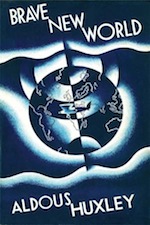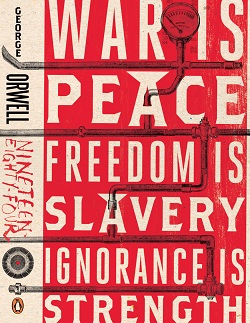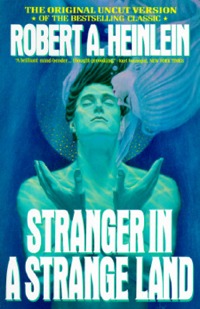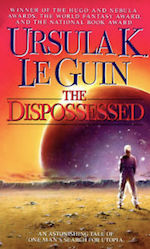Science fiction obviously attracts me since three of my novels—including my latest, Invasion—have been placed in that category. I think that what I like about sci-fi books is that many of them offer alternate realities, which inevitably involves some criticism of aspects of normal human life. However, the books of this genre that have excited me most are those that totally concentrate on questioning and satirically attacking the established values of the contemporary society.
It is hard to focus on only five favorite sci-fi satires, but not impossible…
Brave New World by Aldous Huxley
 Huxley’s Brave New World is an obvious choice. The book is a satirical attack on the tendencies Huxley saw in the culture of the 1930s toward human addiction to pleasure, especially sexual pleasure, the division of society into castes that are brainwashed to love their lot, the concentration of all power in the state, and the dumbification of the civilization. The culture of this new century shows that Huxley’s vision was not far off: our society certainly has a focus on sexual pleasure, although not as great as that of our focus on money. And in the last couple of decades American government has become increasingly centralized and powerful and the culture delivering increasingly brainless titillation.
Huxley’s Brave New World is an obvious choice. The book is a satirical attack on the tendencies Huxley saw in the culture of the 1930s toward human addiction to pleasure, especially sexual pleasure, the division of society into castes that are brainwashed to love their lot, the concentration of all power in the state, and the dumbification of the civilization. The culture of this new century shows that Huxley’s vision was not far off: our society certainly has a focus on sexual pleasure, although not as great as that of our focus on money. And in the last couple of decades American government has become increasingly centralized and powerful and the culture delivering increasingly brainless titillation.
Nineteen Eighty-Four by George Orwell
 Orwell’s novel is an equally concentrated attack, this time on the Big Brother direction that fascist and communist societies had taken and were taking their people. Orwell saw the average human becoming increasingly helpless against the all-powerful tentacles of the State. It seems that today Big Brother watching us is becoming even more ubiquitous than Orwell was able to imagine, the tentacles of the State reaching further and further into all aspects of our lives. And this in societies that are not yet fascist.
Orwell’s novel is an equally concentrated attack, this time on the Big Brother direction that fascist and communist societies had taken and were taking their people. Orwell saw the average human becoming increasingly helpless against the all-powerful tentacles of the State. It seems that today Big Brother watching us is becoming even more ubiquitous than Orwell was able to imagine, the tentacles of the State reaching further and further into all aspects of our lives. And this in societies that are not yet fascist.
Stranger in a Strange Land by Robert Heinlein
 Stranger in a Strange Land is an example of a novel that brings an alien to earth (in this case the alien is human, although brought up on Mars) and then lets him respond to the flaws he finds in the dominant society. Written in the late ’50s, the book concentrates some of its attack on the strict sexual restrictions of that time, restrictions not, let’s say, particularly noticeable today.
Stranger in a Strange Land is an example of a novel that brings an alien to earth (in this case the alien is human, although brought up on Mars) and then lets him respond to the flaws he finds in the dominant society. Written in the late ’50s, the book concentrates some of its attack on the strict sexual restrictions of that time, restrictions not, let’s say, particularly noticeable today.
Player Piano by Kurt Vonnegut
 Much of Vonnegut’s work, both sci-fi and other, is a satirical attack on man’s tendency to take everything seriously, a theme of my work also. But the novel that makes the most clear and focused satirical attack on the established society or its tendencies as projected into the future is Player Piano. It makes an almost Luddite criticism of the way capitalism and technology seem to be developing. In the novel, Vonnegut imagines a world dominated by a supercomputer and run by a “one-percent” of engineers who live a life of isolated luxury, in contrast to the sad powerless lives of the masses. Machines have eliminated all but a few technical jobs, and the dominant class does nothing to alleviate the misery of the majority. Vonnegut even foresees that electing an unintelligent president is irrelevant since the real power lies with the rich engineering elite. The book seems more pertinent today than ever, since the unemployment, inequalities, and vast chasm between the super-rich and most others that Vonnegut anticipated are now becoming even more rampant.
Much of Vonnegut’s work, both sci-fi and other, is a satirical attack on man’s tendency to take everything seriously, a theme of my work also. But the novel that makes the most clear and focused satirical attack on the established society or its tendencies as projected into the future is Player Piano. It makes an almost Luddite criticism of the way capitalism and technology seem to be developing. In the novel, Vonnegut imagines a world dominated by a supercomputer and run by a “one-percent” of engineers who live a life of isolated luxury, in contrast to the sad powerless lives of the masses. Machines have eliminated all but a few technical jobs, and the dominant class does nothing to alleviate the misery of the majority. Vonnegut even foresees that electing an unintelligent president is irrelevant since the real power lies with the rich engineering elite. The book seems more pertinent today than ever, since the unemployment, inequalities, and vast chasm between the super-rich and most others that Vonnegut anticipated are now becoming even more rampant.
The Dispossessed by Ursula K. Le Guin
 The fifth sci-fi book I would choose is one of two books in the Hainish Cycle by Ursula K.Le Guin, The Dispossessed or The Left Hand of Darkness. What I like about both books is their forcing the reader to consider alternate ways of organizing a society and thus questioning the way modern civilization organizes its. In The Left Hand of Darkness, Le Guin imagines a society in which the humans are most of the time androgynous and only become male or female once a month, and at that time can play either the male or female role. The book forces us to consider “normal” human sexuality and the ways it limits and complicates normal life.
The fifth sci-fi book I would choose is one of two books in the Hainish Cycle by Ursula K.Le Guin, The Dispossessed or The Left Hand of Darkness. What I like about both books is their forcing the reader to consider alternate ways of organizing a society and thus questioning the way modern civilization organizes its. In The Left Hand of Darkness, Le Guin imagines a society in which the humans are most of the time androgynous and only become male or female once a month, and at that time can play either the male or female role. The book forces us to consider “normal” human sexuality and the ways it limits and complicates normal life.
But The Dispossessed is a more complex look at multiple ways of organizing societies and thus becomes my fifth choice. On the planet Urras, Le Guin introduces us to three different ways of organizing a society. By having her protagonist spend time in each she lets us see the assets and limitations of each: a capitalist society, a communist-socialist society, and a third that is trying to succeed without any central governmental control. Although Le Guin clearly leans towards the anarchical alternative, the novel is a clear-eyed critique of all three.
My new novel, Invasion, has clear connections to all five of the books mentioned above. In this book a group of super-intelligent aliens react to and criticize the society they have come to earth to play in and with. And many of the specific horrors of contemporary civilization that they find are similar to those of the five novels discussed above: nuclear weapons; a highly technological capitalist society creating dislocations and inequality; the spreading of Big Brother invasions into all aspects of people’s lives; and the deadly seriousness with which humans approach almost everything. The novel climaxes with a million people in a gigantic gathering in New York’s Central Park, part mass anti-establishment protest, and part gigantic music-in, dance-in for-the-helluvit fun fest.
So Invasion follows in the tradition of satiric science fiction, and I am proud to be part of this tradition.
 Luke Rhinehart is the acclaimed author of eight works of fiction, of which the best known is The Dice Man, a comic novel about a psychiatrist’s discovery that the secret of human fulfilment and happiness is to turn over decision-making to chance in the form of listing options and casting dice. He was named Novelist of the Century by Loaded magazine. Invasion is his latest novel.
Luke Rhinehart is the acclaimed author of eight works of fiction, of which the best known is The Dice Man, a comic novel about a psychiatrist’s discovery that the secret of human fulfilment and happiness is to turn over decision-making to chance in the form of listing options and casting dice. He was named Novelist of the Century by Loaded magazine. Invasion is his latest novel.










